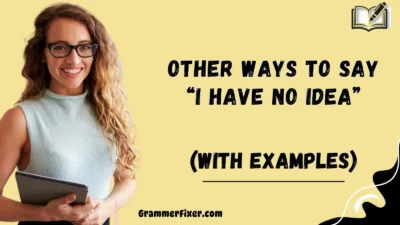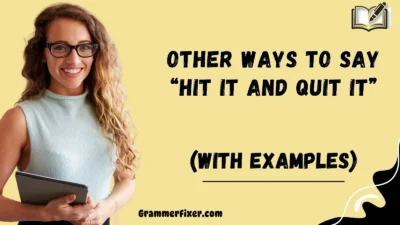Finding the right words to show care, warmth, and empathy can completely change the way a message is received. While the phrase “I hope everything is going well” is polite and widely used, it can sometimes feel cliché or impersonal. By exploring thoughtful alternatives, you can make your emails, texts, and conversations feel more genuine, personal, and meaningful.
Below, you’ll find 30 alternatives you can use, complete with their meanings, scenarios, tones, and best uses.
What Does “I Hope Everything Is Going Well” Mean?
The phrase “I hope everything is going well” is a friendly, considerate expression used to check in on someone’s well-being, situation, or progress. It conveys warmth, empathy, and politeness, making it a versatile phrase for both personal and professional communication.
When to Use “I Hope Everything Is Going Well”?
You can use it in:
- Emails to colleagues, clients, or business partners.
- Texts to friends or family as a quick check-in.
- Letters to show thoughtful concern.
- Professional settings when you want to remain polite and considerate.
Is It Professional/Polite to Say “I Hope Everything Is Going Well”?
Yes. It is considered professional, polite, and friendly in almost all contexts. However, using it too often can make your communication feel generic or insincere, which is why alternatives are valuable.
Pros or Cons
Pros:
- Polite and versatile in tone.
- Respects boundaries while showing care.
- Appropriate for both personal and professional contexts.
Cons:
- Can feel overused or cliché.
- May sound impersonal if not followed by something specific.
- Sometimes too vague to show genuine concern.
1. I Hope You’re Doing Well
Meaning: A classic variation of the original phrase, often used in emails and letters.
Detailed Explanation: It’s slightly shorter and feels direct yet warm.
Scenario Example:
“Hi Maria, I hope you’re doing well. I wanted to follow up on the project timeline we discussed.”
Best Use: Professional emails, polite introductions, and general check-ins.
Worst Use: In a serious or urgent situation (e.g., medical emergency or crisis) where the phrase may feel out of place or too casual.
Tone: Formal, professional, polite.
2. I Trust This Email Finds You Well
Meaning: A professional alternative often used in formal emails.
Detailed Explanation: It emphasizes trust and consideration while acknowledging the recipient’s current state.
Scenario Example:
“Dear Mr. Patel, I trust this email finds you well. I’m writing to provide an update on the shipping process.”
Best Use: Business communication, formal letters.
Worst Use: In casual chats, texts, or informal conversations—it sounds too stiff and distant.
Tone: Respectful, professional, reserved.
3. I Hope All Is Well
Meaning: A universal, flexible phrase often used in both personal and professional contexts.
Detailed Explanation: It’s short, friendly, and non-intrusive, making it suitable for quick check-ins.
Scenario Example:
“Hi Steven, I hope all is well. Just checking in to see how the new role is treating you.”
Best Use: Personal emails, professional but casual communication.
Worst Use: When trying to acknowledge a specific hardship (e.g., during a breakup, illness, or crisis). It can feel too vague or detached.
Tone: Neutral, polite, versatile.
4. I Hope Things Are Going Smoothly
Meaning: A gentle and optimistic variation that focuses on life or work running without difficulty.
Detailed Explanation: It conveys that you wish the recipient’s projects, transitions, or responsibilities are progressing with ease.
Scenario Example:
“Hi Jacob, I hope things are going smoothly with your new project launch.”
Best Use: Professional updates, colleagues handling major projects, or personal milestones.
Worst Use: In situations involving personal struggles, grief, or health crises—it may sound insensitive or dismissive.
Tone: Encouraging, considerate, professional.
5. I Hope You’re Having a Great Week
Meaning: A time-specific alternative that adds a touch of friendliness by referring to the week.
Detailed Explanation: It’s particularly useful in workplace communication where the week’s rhythm matters (mid-week check-ins, Monday greetings, etc.).
Scenario Example:
“Hi Sharon, I hope you’re having a great week so far. I just wanted to touch base on the report draft.”
Best Use: Professional emails, networking follow-ups, or casual friendly notes.
Worst Use: During serious matters or crises—mentioning a “great week” could feel tone-deaf.
Tone: Friendly, upbeat, casual-professional.
6. I Hope You’re Keeping Well
Meaning: A warm and considerate phrase that emphasizes health and well-being.
Detailed Explanation: This phrase is often used in both personal letters and professional emails, especially during times when health and safety are priorities (e.g., pandemic, recovery).
Scenario Example:
“Dear Russell, I hope you’re keeping well. Looking forward to hearing your feedback on the proposal.”
Best Use: When addressing health-related contexts, general professional correspondence, or kind personal notes.
Worst Use: In overly casual chats—it can sound too formal or outdated for a quick text.
Tone: Supportive, respectful, thoughtful.
7. I Hope You’re Staying Safe
Meaning: A caring phrase that acknowledges safety and protection, often used during challenging times.
Detailed Explanation: It became more common during the pandemic and in situations involving travel, natural disasters, or crises.
Scenario Example:
“Hi Harriet, I hope you’re staying safe during your travels. Wishing you a smooth journey.”
Best Use: During difficult times, health concerns, or when safety is a real factor (travel, emergencies).
Worst Use: In a normal, everyday business email—it may feel unnecessary or overly dramatic.
Tone: Compassionate, serious, empathetic.
8. I Hope Life Is Treating You Well
Meaning: A more personal alternative that emphasizes the recipient’s overall life circumstances.
Detailed Explanation: It feels warmer and more human, making it perfect for personal relationships or longer gaps in communication.
Scenario Example:
“Hi Anastasia, it’s been a while! I hope life is treating you well. Let’s catch up soon.”
Best Use: Old friends, acquaintances, or reconnecting after a long time.
Worst Use: In strictly professional or formal emails—it can come across as too casual or intrusive.
Tone: Friendly, human, empathetic.
9. I Hope You’re Thriving
Meaning: A positive, empowering alternative that conveys not just being “well,” but flourishing and succeeding.
Detailed Explanation: It suggests you believe the person is progressing, achieving goals, and living with confidence.
Scenario Example:
“Hi Parker, I hope you’re thriving in your new role. It sounds like such an exciting opportunity.”
Best Use: Career transitions, new jobs, or when encouraging confidence and growth.
Worst Use: In a context where the person is struggling, grieving, or recovering—it may feel insensitive or unrealistic.
Tone: Optimistic, encouraging, confident.
10. I Hope You’re Enjoying Your Day
Meaning: A casual, lighthearted phrase that refers to the present moment rather than life overall.
Detailed Explanation: It works best in short emails, chats, or quick check-ins where you want to sound friendly without being too formal.
Scenario Example:
“Hi Carlton, I hope you’re enjoying your day. Just wanted to confirm our call for tomorrow.”
Best Use: Informal emails, texts, or conversations with colleagues or friends.
Worst Use: In serious or urgent professional communication—it may feel too casual or dismissive.
Tone: Light, cheerful, informal.
11. I Hope Everything Is Running Smoothly
Meaning: A practical and reassuring phrase suggesting you hope tasks, projects, or responsibilities are progressing without issues.
Detailed Explanation: It works particularly well in business or project management contexts where workflow and progress matter.
Scenario Example:
“Hi Dami, I hope everything is running smoothly with the software rollout. Let me know if you need any support.”
Best Use: Project updates, professional check-ins, team communications.
Worst Use: In personal emotional situations (breakups, illness, grief) where “running smoothly” sounds too mechanical or impersonal.
Tone: Professional, supportive, encouraging.
12. I Hope You’re Settling In Well
Meaning: A thoughtful phrase tailored for someone starting something new (job, home, city, role).
Detailed Explanation: It acknowledges the transitional period someone is experiencing, showing support and understanding.
Scenario Example:
“Hi Steven, I hope you’re settling in well at your new office. Excited to hear how things are going.”
Best Use: New employees, colleagues moving, or friends starting new chapters.
Worst Use: In general business emails—it may sound irrelevant or overly personal if no transition is happening.
Tone: Warm, empathetic, encouraging.
13. I Hope You’re Having a Good Day
Meaning: A simple, everyday expression of friendliness that lightens the tone of communication.
Detailed Explanation: It’s short and non-intrusive, often used in casual workplace chats, quick check-ins, or text messages.
Scenario Example:
“Hi Melissa, I hope you’re having a good day. I just wanted to follow up on yesterday’s discussion.”
Best Use: Casual workplace communication, personal texts, polite openings in short emails.
Worst Use: In formal, high-level business letters where it may sound too light or unprofessional.
Tone: Casual, friendly, approachable.
14. I Hope You’re Doing Okay
Meaning: A gentler, more empathetic phrase that suggests concern for someone’s well-being.
Detailed Explanation: It is often used when the recipient may be facing stress, challenges, or uncertainty. It doesn’t assume positivity but shows genuine care.
Scenario Example:
“Hi Scott, I hope you’re doing okay. I know things have been hectic lately with the transition.”
Best Use: Supporting a friend, colleague, or loved one during stressful times.
Worst Use: In a strictly professional or upbeat setting (e.g., congratulatory note) where “okay” feels underwhelming.
Tone: Gentle, caring, empathetic.
15. I Hope You’re in Good Health
Meaning: A formal, respectful variation that emphasizes physical well-being.
Detailed Explanation: It is more common in letters, formal emails, and international communication, especially when health and safety are of concern.
Scenario Example:
“Dear Yussef, I hope you’re in good health. I look forward to discussing the upcoming contract.”
Best Use: Formal business correspondence, letters, cross-cultural communication.
Worst Use: In casual chats or texts—it may sound too stiff or outdated.
Tone: Formal, polite, dignified.
Hope Everything Well
Meaning: A friendly, casual greeting used to wish someone is doing fine or that everything is okay.
Detailed Explanation:
It’s often used at the start of emails, messages, or letters to show care and concern. The phrase is casual and warm, but the grammatically polished version is “Hope everything is well”. It works well for light check-ins or informal communication.
Scenario Example:
- “Hope everything is well! Just wanted to see if you got my email.”
Best Use: Casual or semi-formal emails, messaging friends or colleagues you have a friendly rapport with, or light professional follow-ups.
Worst Use: Highly formal emails, official corporate correspondence, or situations requiring a polished, professional tone.
Tone: Friendly, casual, caring
I Hope Everything Is Going Well With You
Meaning: A polite, friendly phrase used to check in on someone’s overall well-being, suitable for both personal and professional contexts.
Detailed Explanation:
This phrase is slightly more formal than casual greetings like “Hope everything well.” It communicates consideration and attentiveness, making it ideal for emails, messages, or letters where you want to start on a warm and professional note.
Scenario Example:
- “I hope everything is going well with you. I wanted to follow up on our last discussion about the project.”
Best Use: Professional or semi-formal emails, friendly check-ins with colleagues, or messaging someone you haven’t contacted in a while.
Worst Use: Overly casual text messages to close friends (can feel unnecessarily formal), or in contexts requiring very concise communication.
Tone: Polite, considerate, friendly
16. I Hope You’re Enjoying Your Week
Meaning: A casual, friendly phrase that makes communication feel light and positive.
Detailed Explanation: Instead of focusing on overall well-being, it zooms in on the week’s experience, making it more time-specific.
Scenario Example:
“Hi Michael, I hope you’re enjoying your week so far. Have you had a chance to review the new proposal?”
Best Use: Mid-week professional emails, networking conversations, and casual check-ins.
Worst Use: During tough or stressful times when “enjoying” may sound tone-deaf (e.g., layoffs, illness, or grief).
Tone: Upbeat, casual, lighthearted.
17. I Hope You’re Doing Great
Meaning: A more enthusiastic and positive twist on “doing well.”
Detailed Explanation: It conveys energy, optimism, and genuine good wishes, making it suitable for motivating or friendly communication.
Scenario Example:
“Hi Holly, I hope you’re doing great! I wanted to congratulate you on the successful launch.”
Best Use: Personal messages, celebratory emails, and encouraging notes.
Worst Use: In formal or reserved business emails, where “great” might feel too casual or exaggerated.
Tone: Positive, enthusiastic, uplifting.
18. I Hope You’re Staying Healthy
Meaning: A caring phrase centered on physical well-being.
Detailed Explanation: Especially useful during pandemic times, flu season, or after medical events, this shows genuine concern for someone’s health.
Scenario Example:
“Hi Mathew, I hope you’re staying healthy during this busy travel season.”
Best Use: Health-related contexts, supportive personal notes, or thoughtful check-ins.
Worst Use: In strictly task-focused professional communication—it can feel unnecessary or unrelated.
Tone: Compassionate, warm, caring.
19. I Hope Things Are Going Well for You
Meaning: A personalized variation of the original phrase that adds a direct sense of care.
Detailed Explanation: Including “for you” makes the message feel more individual and less generic, adding a touch of genuine concern.
Scenario Example:
“Hi Howard, I hope things are going well for you. I’d love to hear about your new project.”
Best Use: One-to-one emails, reconnecting with contacts, or casual professional notes.
Worst Use: In formal mass communications (like newsletters) where it may feel too personal for the audience.
Tone: Friendly, warm, conversational.
20. I Hope You’re Having a Wonderful Day
Meaning: A bright, cheerful variation that instantly sets a positive tone.
Detailed Explanation: It goes beyond “good” or “great” by amplifying the positivity, making it feel more enthusiastic and warm.
Scenario Example:
“Hi Russell, I hope you’re having a wonderful day. Just wanted to confirm our meeting schedule.”
Best Use: Friendly professional emails, personal conversations, or customer service interactions.
Worst Use: In serious, urgent, or sensitive conversations—it can feel too cheerful and mismatched.
Tone: Cheerful, upbeat, kind.
21. I Hope You’re Having a Positive Week
Meaning: A gentle, optimistic phrase that emphasizes positivity and balance in someone’s week.
Detailed Explanation: Unlike “great week,” this wording feels more thoughtful and less exaggerated, making it suitable for professional or personal use.
Scenario Example:
“Hi Harriet, I hope you’re having a positive week so far. I’d love your input on the draft presentation.”
Best Use: Professional communication, mentoring, or supportive check-ins.
Worst Use: In contexts of grief, illness, or difficulty, where “positive week” may feel insensitive or unrealistic.
Tone: Encouraging, respectful, warm.
22. I Hope You’re Finding Joy in Your Day
Meaning: A thoughtful and empathetic phrase that goes beyond well-being to focus on happiness and emotional fulfillment.
Detailed Explanation: This is especially fitting when you want to express genuine care in a personal or semi-professional context.
Scenario Example:
“Hi Burrows, I hope you’re finding joy in your day. Let’s catch up soon over coffee.”
Best Use: Personal connections, thoughtful notes, or warm professional relationships.
Worst Use: In strictly professional or formal letters, where it may sound too intimate or overly emotional.
Tone: Warm, empathetic, personal.
23. I Hope You’re Feeling Good
Meaning: A casual, friendly alternative that checks in on both mood and well-being.
Detailed Explanation: Less formal than “I hope you’re in good health,” this version feels more like a quick, caring gesture.
Scenario Example:
“Hi Anastasia, I hope you’re feeling good today. How’s the new schedule working for you?”
Best Use: Personal texts, casual workplace chats, friendly notes.
Worst Use: In formal professional communication where “feeling good” may sound too casual or vague.
Tone: Friendly, casual, lighthearted.
24. I Hope Everything Is Working Out Well
Meaning: A supportive and encouraging phrase that acknowledges someone’s efforts or challenges.
Detailed Explanation: It implies you understand they may be facing something new or difficult, and you wish them success in navigating it.
Scenario Example:
“Hi Parker, I hope everything is working out well with your new role.”
Best Use: When someone is going through a change, transition, or challenge.
Worst Use: In generic business introductions, where it may feel too personal or situationally misplaced.
Tone: Supportive, considerate, empathetic.
25. I Hope You’re Having a Pleasant Day
Meaning: A classic and polite variation that sounds respectful and neutral.
Detailed Explanation: This is especially suitable for formal or semi-formal communication, where you want to maintain politeness without being overly casual.
Scenario Example:
“Dear Jacob, I hope you’re having a pleasant day. I wanted to follow up regarding your feedback on the draft.”
Best Use: Formal emails, client communication, polite professional notes.
Worst Use: In casual chats or texts—it may sound stiff, outdated, or overly formal.
Tone: Polite, neutral, dignified.
26. I Hope You’re Staying Positive
Meaning: A supportive phrase that encourages resilience and optimism during challenges.
Detailed Explanation: It acknowledges that life may not always be easy but gently encourages a hopeful mindset.
Scenario Example:
“Hi Sharon, I hope you’re staying positive through all the recent changes at work.”
Best Use: Supporting someone going through transitions, challenges, or stressful times.
Worst Use: In a formal, neutral business email, it may come across as too personal or patronizing.
Tone: Encouraging, supportive, hopeful.
27. I Hope You’re Doing Fine
Meaning: A neutral and straightforward phrase that is polite without being overly emotional.
Detailed Explanation: It strikes a balance between casual and formal, making it useful in short, efficient communication.
Scenario Example:
“Hi Melissa, I hope you’re doing fine. Just following up on yesterday’s task list.”
Best Use: Quick check-ins, brief professional emails, or casual workplace notes.
Worst Use: In emotional or sensitive contexts, “fine” may sound underwhelming or dismissive.
Tone: Neutral, polite, concise.
28. I Hope You’re Finding Balance
Meaning: A thoughtful and empathetic phrase that recognizes the challenge of managing work, life, or responsibilities.
Detailed Explanation: It shows awareness of someone’s busyness or stress, making it feel personal and supportive.
Scenario Example:
“Hi Adam, I hope you’re finding balance between your new role and family life.”
Best Use: Messages to colleagues, friends, or employees juggling responsibilities.
Worst Use: In strictly formal correspondence—it may feel too personal or out of place.
Tone: Caring, empathetic, thoughtful.
29. I Hope You’re Having a Peaceful Day
Meaning: A gentle and calming phrase that emphasizes tranquility rather than productivity or excitement.
Detailed Explanation: It’s particularly thoughtful in times when peace of mind is valuable (stressful weeks, difficult life periods).
Scenario Example:
“Hi Mathew, I hope you’re having a peaceful day despite the workload.”
Best Use: Personal notes, wellness-focused communication, supportive contexts.
Worst Use: In high-energy or celebratory situations—it may sound too subdued or mismatched.
Tone: Calm, gentle, considerate.
30. I Hope Everything Is Going Great for You
Meaning: A strong, enthusiastic version of the original phrase that conveys genuine good wishes for success and happiness.
Detailed Explanation: It combines the warmth of well-being with an extra layer of optimism and energy, making it sound uplifting.
Scenario Example:
“Hi Russell, I hope everything is going great for you. Congratulations again on your promotion!”
Best Use: Celebratory notes, congratulatory messages, or upbeat professional exchanges.
Worst Use: In serious or somber situations, it may feel overly cheerful or out of touch.
Tone: Optimistic, enthusiastic, cheerful.
I Hope Everything Goes Well
Meaning: A polite and positive way to wish someone success or smooth progress in a task, event, or situation.
Detailed Explanation:
This phrase is versatile and works in personal and professional contexts. It conveys optimism and care without being intrusive. Unlike generic greetings, it specifically shows that you hope the recipient experiences a favorable outcome.
Scenario Example:
- “I hope everything goes well with your presentation tomorrow.”
Best Use: Personal emails, professional but friendly messages, or messages offering support before an event or task.
Worst Use: Situations where negative outcomes have already occurred, or where a more neutral acknowledgment is needed.
Tone: Friendly, supportive, encouraging
Hope Everything Is Fine
Meaning: A polite way to check in and express concern, showing that you care about someone’s well-being or situation.
Detailed Explanation:
This phrase is commonly used in both personal and professional communication. It conveys friendly concern or courtesy without being intrusive. Unlike generic greetings, it specifically acknowledges the other person’s current state or circumstances.
Scenario Examples:
- “Hi John, hope everything is fine with your family.”
Best Use: Friendly emails, messages, or calls where you want to show concern or polite inquiry.
Worst Use: Situations where the person has already reported issues or problems, or when formal communication requires neutral phrasing.
Tone: Friendly, considerate, empathetic
Conclusion
The phrase “I hope everything is going well” is polite and versatile, but using it repeatedly can feel cliché or impersonal. These 30 alternatives allow you to adapt your tone—whether you’re writing a professional email, a supportive message, or a friendly check-in.



